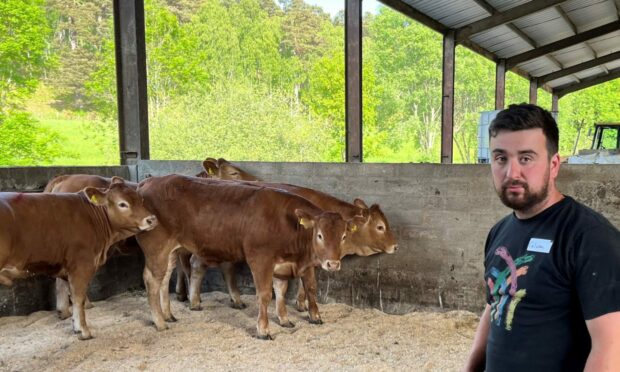Becoming a Monitor Farm has highlighted good practice as well as some areas for change and improvement for the Smith family from Auchernack near Grantown-on-Spey.
At the open summer meeting earlier this month, visitors heard about the progress they had made and discussed key farming issues with technical specialists as part of a farm tour.
Malcolm and Sammi, together with son Calum, farm 140 suckler cows and 120 store cattle on the 800-acre unit.
The focus is on store calf production using predominantly Limousin sires.
For ease of management, cattle are overwintered indoors and calving is split, with a third of the herd calving in autumn/winter, and the rest in spring.
An Integrated Land Management Plan, carried out by SAC, highlighted strengths of the farm, including a good reputation for producing high-quality store calves, low borrowings, below average labour costs and excellent use of slurries and manure to reduce inorganic fertiliser application.
It made recommendations to improve resilience and profitability at Auchernack too, with suggestions to graze more of the substantial hill ground, with the dual benefits of enhancing biodiversity and improving carbon capture.
The hill ground was visited by the Monitor Farm’s management group before the meeting to assess its potential.
Nikki Yoxall, head of research for the Pasture for Life organisation, explained that improving diversity on upland farms would benefit pollinators and soil health, improving environmental and financial sustainability.
Specialists from Soil Essentials sampled all productive grass and arable fields, and SRUC analysis highlighted areas which required targeted applications of lime.
The results have allowed the Smiths to focus on fields which are sub-optimal for pH, while Alistair Gordon from Robertsons Crop Services also talked visitors through making efficient use of slurries and manures, something the Smiths are doing well.
Soil organic carbon is high across the farm, highlighting the importance of organic recycling on the fields and good soil management.
This was demonstrated by a carbon audit carried out in spring which showed Auchernack to be a farm that captures more carbon than it produces.
Jane Thomson from Shearwell Data, spoke about the potential to use EID to ‘work smarter rather than harder’ to produce what the market wants.
She said that it would help track individual animal performance, identifying those which work best for the farm and situation, and also enable stock to be sold at the optimum weight.
Malcom said: “We’ve made small adjustments on the basis of our Monitor Farm management group discussions to timing of sales of our calves.
“We’re just getting into the mindset of the need to change and adapt, through advice, data and information and reflection, without changing drastically the system that we have that has got us to where we are, successfully up to now.”
Malcolm is also involved with the Royal Highland Educational Trust (RHET) and visitors at the meeting took part in a charity stockjudging competition, raising £340 for the organisation.
For more information about future meetings and to join the Strathspey Monitor Farm Community Group, visit www.monitorfarms.co.uk or contact Monitor Farm regional adviser Peter Beattie at pbeattie@qmscotland.co.uk, tel 07769 366614, or email monitorfarm@qmscotland.co.uk.
